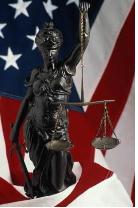USA
Pro se representation is up -- and that's bad, say judges in ABA survey
 A survey of state judges by the American Bar Association indicates that fewer parties in civil cases are being represented by lawyers, and in the opinion of most of the judges, the outcomes of those cases are worse for it.
A survey of state judges by the American Bar Association indicates that fewer parties in civil cases are being represented by lawyers, and in the opinion of most of the judges, the outcomes of those cases are worse for it.
The Coalition for Justice, an arm of the ABA that focuses on access to the courts, conducted the survey in an attempt to measure the impact of the economic recession. The results, released Monday, echo warnings from the Brennan Center for Justice and other groups who say the nation's judicial systems are increasingly overburdened.
In one question, judges were asked to compare representation in their courts in 2009 to representation in previous years. Sixty percent of judges said fewer parties had lawyers, while 3 percent said representation had increased. The rest said they saw no change.
Asked how the lack of representation affects the parties, 62 percent of all judges said the outcomes are worse for a litigant when he represents himself, while 3 percent said they were better. The rest said there was no impact. The judges who saw worse outcomes said the most common problems for pro se litigants are failure to present necessary evidence, procedural errors, ineffective witness examination and failure to object to evidence properly.
At a news conference, ABA President Carolyn Lamm said that lack of representation causes problems for the rest of the court system by, among other things, consuming more of judges' time. "Parties not being represented in fact delays the proceedings of the court," Lamm said. "They slow down the ability of the court to hear cases."
There were 986 state judges who completed the survey, out of an estimated potential pool of 20,400 nationwide, according to the ABA.
(Published by Law.com – July 13, 2010)